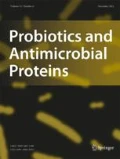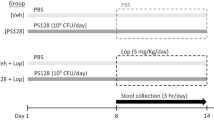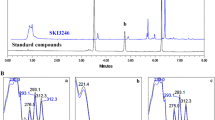Abstract
Irritable bowel syndrome (IBS) is a common functional gastrointestinal disorder characterized by abdominal pain and alterations in bowel habits. Current treatments for IBS are unsatisfactory due to its multifactorial pathogenesis involving the microbiota–gut–brain axis. Lactobacillus plantarum PS128 (PS128) was reported to exhibit neuromodulatory activity which may be beneficial for improving IBS. This study aimed to investigate the effect of PS128 on visceral hypersensitivity (VH) and the gut–brain axis using a 5-hydroxytryptophan (5-HTP)-induced VH rat model without colonic inflammation induction, mimicking the characteristics of IBS. Male Sprague–Dawley rats were administered with PS128 (109 CFU in 0.2 mL saline/rat/day) or saline (0.2 mL saline/rat/day) for 14 days. Colorectal distension (CRD) with simultaneous electromyography recording was performed 30 min before and 30 min after the 5-HTP injection. Levels of neuropeptides and neurotrophins were analyzed. PS128 significantly reduced VH induced by the 5-HTP injection and CRD. Neurotransmitter protein levels, substance P, CGRP, BDNF, and NGF, were decreased in the dorsal root ganglion but increased in the spinal cord in response to the 5-HTP injection; PS128 reversed these changes. The hypothalamic–pituitary–adrenal axis was modulated by PS128 with decreased corticosterone concentration in serum and the expression of mineralocorticoid receptors in the amygdala. Oral administration of PS128 inhibited 5-HTP-induced VH during CRD. The ameliorative effect on VH suggests the potential application of PS128 for IBS.







Similar content being viewed by others
References
Chang FY, Lu CL, Chen TS (2010) The current prevalence of irritable bowel syndrome in Asia. J Neurogastroenterol Motil 16:389–400
Quigley EM, Abdel-Hamid H, Barbara G, Bhatia SJ, Boeckxstaens G, De Giorgio R, Delvaux M, Drossman DA, Foxx-Orenstein AE, Guarner F, Gwee KA, Harris LA, Hungin AP, Hunt RH, Kellow JE, Khalif IL, Kruis W, Lindberg G, Olano C, Moraes-Filho JP, Schiller LR, Schmulson M, Simren M, Tzeuton C (2012) A global perspective on irritable bowel syndrome: a consensus statement of the World Gastroenterology Organisation Summit Task Force on irritable bowel syndrome. J Clin Gastroenterol 46:356–366
Grundmann O, Yoon SL (2010) Irritable bowel syndrome: epidemiology, diagnosis and treatment: an update for health-care practitioners. J Gastroenterol Hepatol 25:691–699
Lu CL, Chen CY, Lang HC, Luo JC, Wang SS, Chang FY, Lee SD (2003) Current patterns of irritable bowel syndrome in Taiwan: the Rome II questionnaire on a Chinese population. Aliment Pharmacol Ther 18:1159–1169
Mearin F, Lacy BE, Chang L, Chey WD, Lembo AJ, Simren M, Spiller R (2016) Bowel Disorders. Gastroenterology 150:1393–1407
Chey WD, Kurlander J, Eswaran S (2015) Irritable bowel syndrome: a clinical review. JAMA 313:949–958
Fayyaz M, Lackner JM (2008) Serotonin receptor modulators in the treatment of irritable bowel syndrome. Ther Clin Risk Manag 4:41–48
Ford AC, Brandt LJ, Young C, Chey WD, Foxx-Orenstein AE, Moayyedi P (2009) Efficacy of 5-HT3 antagonists and 5-HT4 agonists in irritable bowel syndrome: systematic review and meta-analysis. Am J Gastroenterol 104:1831–1843
Ford AC, Quigley EM, Lacy BE, Lembo AJ, Saito YA, Schiller LR, Soffer EE, Spiegel BM, Moayyedi P (2014) Effect of antidepressants and psychological therapies, including hypnotherapy, in irritable bowel syndrome: systematic review and meta-analysis. Am J Gastroenterol 109:1350–1365
Chang L, Lembo A, Sultan S (2014) American Gastroenterological Association Institute Technical Review on the pharmacological management of irritable bowel syndrome. Gastroenterology 147:1149–1172
Chey WD, Lembo AJ, Lavins BJ, Shiff SJ, Kurtz CB, Currie MG, MacDougall JE, Jia XD, Shao JZ, Fitch DA, Baird MJ, Schneier HA, Johnston JM (2012) Linaclotide for irritable bowel syndrome with constipation: a 26-week, randomized, double-blind, placebo-controlled trial to evaluate efficacy and safety. Am J Gastroenterol 107:1702–1712
Jeffery IB, O’Toole PW, Ohman L, Claesson MJ, Deane J, Quigley EM, Simren M (2012) An irritable bowel syndrome subtype defined by species-specific alterations in faecal microbiota. Gut 61:997–1006
Rajilic-Stojanovic M, Biagi E, Heilig HG, Kajander K, Kekkonen RA, Tims S, de Vos WM (2011) Global and deep molecular analysis of microbiota signatures in fecal samples from patients with irritable bowel syndrome. Gastroenterology 141:1792–1801
Rajilic-Stojanovic M, Jonkers DM, Salonen A, Hanevik K, Raes J, Jalanka J, de Vos WM, Manichanh C, Golic N, Enck P, Philippou E, Iraqi FA, Clarke G, Spiller RC, Penders J (2015) Intestinal microbiota and diet in IBS: causes, consequences, or epiphenomena? Am J Gastroenterol 110:278–287
Menees SB, Maneerattannaporn M, Kim HM, Chey WD (2012) The efficacy and safety of rifaximin for the irritable bowel syndrome: a systematic review and meta-analysis. Am J Gastroenterol 107:28–35
Verdu EF, Bercik P, Bergonzelli GE, Huang XX, Blennerhasset P, Rochat F, Fiaux M, Mansourian R, Corthesy-Theulaz I, Collins SM (2004) Lactobacillus paracasei normalizes muscle hypercontractility in a murine model of postinfective gut dysfunction. Gastroenterology 127:826–837
Johnson AC, Greenwood-Van Meerveld B, McRorie J (2011) Effects of Bifidobacterium infantis 35624 on post-inflammatory visceral hypersensitivity in the rat. Dig Dis Sci 56:3179–3186
Ait-Belgnaoui A, Han W, Lamine F, Eutamene H, Fioramonti J, Bueno L, Theodorou V (2006) Lactobacillus farciminis treatment suppresses stress induced visceral hypersensitivity: a possible action through interaction with epithelial cell cytoskeleton contraction. Gut 55:1090–1094
O’Mahony L, McCarthy J, Kelly P, Hurley G, Luo F, Chen K, O’Sullivan GC, Kiely B, Collins JK, Shanahan F, Quigley EM (2005) Lactobacillus and bifidobacterium in irritable bowel syndrome: symptom responses and relationship to cytokine profiles. Gastroenterology 128:541–551
Dapoigny M, Piche T, Ducrotte P, Lunaud B, Cardot JM, Bernalier-Donadille A (2012) Efficacy and safety profile of LCR35 complete freeze-dried culture in irritable bowel syndrome: a randomized, double-blind study. World J Gastroenterol 18:2067–2075
Theodorou V, Ait Belgnaoui A, Agostini S, Eutamene H (2014) Effect of commensals and probiotics on visceral sensitivity and pain in irritable bowel syndrome. Gut Microbes 5:430–436
Ford AC, Quigley EM, Lacy BE, Lembo AJ, Saito YA, Schiller LR, Soffer EE, Spiegel BM, Moayyedi P (2014) Efficacy of prebiotics, probiotics, and synbiotics in irritable bowel syndrome and chronic idiopathic constipation: systematic review and meta-analysis. Am J Gastroenterol 109:1547–1561
Chao SH, Wu RJ, Watanabe K, Tsai YC (2009) Diversity of lactic acid bacteria in suan-tsai and fu-tsai, traditional fermented mustard products of Taiwan. Int J Food Microbiol 135:203–210
Liu WH, Chuang HL, Huang YT, Wu CC, Chou GT, Wang S, Tsai YC (2016) Alteration of behavior and monoamine levels attributable to Lactobacillus plantarum PS128 in germ-free mice. Behav Brain Res 298:202–209
Liu YW, Liu WH, Wu CC, Juan YC, Wu YC, Tsai HP, Wang S, Tsai YC (2016) Psychotropic effects of Lactobacillus plantarum PS128 in early life-stressed and naive adult mice. Brain Res 1631:1–12
Liu WH, Yang CH, Lin CT, Li SW, Cheng WS, Jiang YP, Wu CC, Chang CH, Tsai YC (2015) Genome architecture of Lactobacillus plantarum PS128, a probiotic strain with potential immunomodulatory activity. Gut Pathogens 7:22
Lu CL, Hsieh JC, Tsaur ML, Huang YH, Wang PS, Wu LL, Liu PY, Chang FY, Lee SD (2007) Estrogen rapidly modulates mustard oil-induced visceral hypersensitivity in conscious female rats: a role of CREB phosphorylation in spinal dorsal horn neurons. Am J Physiol Gastrointest Liver Physiol 292:G438–G446
Lu CL, Hsieh JC, Dun NJ, Oprea TI, Wang PS, Luo JC, Lin HC, Chang FY, Lee SD (2009) Estrogen rapidly modulates 5-hydroxytrytophan-induced visceral hypersensitivity via GPR30 in rats. Gastroenterology 137:1040–1050
Banner SE, Sanger GJ (1995) Differences between 5-HT3 receptor antagonists in modulation of visceral hypersensitivity. Br J Pharmacol 114:558–562
Paxinos G (1998) The rat brain in stereotaxic coordinates. Elsevier Academic Press
Liou YJ, Chen CH, Cheng CY, Chen SY, Chen TJ, Yu YWY, Nian FS, Tsai SJ, Hong CJ (2012) Convergent evidence from mouse and human studies suggests the involvement of zinc finger protein 326 gene in antidepressant treatment response. PLoS One 7:e32984
Meldgaard M, Fenger C, Lambertsen KL, Pedersen MD, Ladeby R, Finsen B (2006) Validation of two reference genes for mRNA level studies of murine disease models in neurobiology. J Neurosci Methods 156:101–110
Dai C, Zheng CQ, Jiang M, Ma XY, Jiang LJ (2013) Probiotics and irritable bowel syndrome. World J Gastroenterol 19:5973–5980
Didari T, Mozaffari S, Nikfar S, Abdollahi M (2015) Effectiveness of probiotics in irritable bowel syndrome: updated systematic review with meta-analysis. World J Gastroenterol 21:3072–3084
Nikfar S, Rahimi R, Rahimi F, Derakhshani S, Abdollahi M (2008) Efficacy of probiotics in irritable bowel syndrome: a meta-analysis of randomized, controlled trials. Dis Colon Rectum 51:1775–1780
Ford AC, Harris LA, Lacy BE, Quigley EMM, Moayyedi P (2018) Systematic review with meta-analysis: the efficacy of prebiotics, probiotics, synbiotics and antibiotics in irritable bowel syndrome. Aliment Pharmacol Ther 48:1044–1060
Whitehead WE, Palsson O, Jones KR (2002) Systematic review of the comorbidity of irritable bowel syndrome with other disorders: what are the causes and implications? Gastroenterology 122:1140–1156
Ladabaum U, Boyd E, Zhao WK, Mannalithara A, Sharabidze A, Singh G, Chung E, Levin TR (2012) Diagnosis, comorbidities, and management of irritable bowel syndrome in patients in a large health maintenance organization. Clin Gastroenterol Hepatol 10:37–45
Laird KT, Tanner-Smith EE, Russell AC, Hollon SD, Walker LS (2016) Short-term and long-term efficacy of psychological therapies for irritable bowel syndrome: a systematic review and meta-analysis. Clin Gastroenterol Hepatol 14:937–947
Desbonnet L, Garrett L, Clarke G, Kiely B, Cryan JF, Dinan TG (2010) Effects of the probiotic Bifidobacterium infantis in the maternal separation model of depression. Neuroscience 170:1179–1188
McKernan DP, Fitzgerald P, Dinan TG, Cryan JF (2010) The probiotic Bifidobacterium infantis 35624 displays visceral antinociceptive effects in the rat. Neurogastroenterol Motil 22:1029–1035
Whorwell PJ, Altringer L, Morel J, Bond Y, Charbonneau D, O’Mahony L, Kiely B, Shanahan F, Quigley EM (2006) Efficacy of an encapsulated probiotic Bifidobacterium infantis 35624 in women with irritable bowel syndrome. Am J Gastroenterol 101:1581–1590
Lu CL, Chang FY, Lang HC, Chen CY, Luo JC, Lee SD (2005) Gender difference on the symptoms, health-seeking behaviour, social impact and sleep quality in irritable bowel syndrome: a Rome II-based survey in an apparent healthy adult Chinese population in Taiwan. Aliment Pharmacol Ther 21:1497–1505
Gschossmann JM, Coutinho SV, Miller JC, Huebel K, Naliboff B, Wong HC, Walsh JH, Mayer EA (2001) Involvement of spinal calcitonin gene-related peptide in the development of acute visceral hyperalgesia in the rat. Neurogastroenterol Motil 13:229–236
Wang WF, Yang YS, Peng LH, Sun G (2006) Alternation of substance P-containing neural pathways in a rat model of irritable bowel syndrome with rectal distension. Chin J Dig Dis 7:211–218
Winston JH, Li Q, Sarna SK (2014) Chronic prenatal stress epigenetically modifies spinal cord BDNF expression to induce sex-specific visceral hypersensitivity in offspring. Neurogastroenterol Motil 26:715–730
Hefti FF, Rosenthal A, Walicke PA, Wyatt S, Vergara G, Shelton DL, Davies AM (2006) Novel class of pain drugs based on antagonism of NGF. Trends Pharmacol Sci 27:85–91
Thompson SW, Bennett DL, Kerr BJ, Bradbury EJ, McMahon SB (1999) Brain-derived neurotrophic factor is an endogenous modulator of nociceptive responses in the spinal cord. Proc Natl Acad Sci U S A 96:7714–7718
Delafoy L, Raymond F, Doherty AM, Eschalier A, Diop L (2003) Role of nerve growth factor in the trinitrobenzene sulfonic acid-induced colonic hypersensitivity. Pain 105:489–497
Delafoy L, Gelot A, Ardid D, Eschalier A, Bertrand C, Doherty AM, Diop L (2006) Interactive involvement of brain derived neurotrophic factor, nerve growth factor, and calcitonin gene related peptide in colonic hypersensitivity in the rat. Gut 55:940–945
Qiao LY, Grider JR (2009) Colitis induces calcitonin gene-related peptide expression and Akt activation in rat primary afferent pathways. Exp Neurol 219:93–103
Gibney SM, Gosselin RD, Dinan TG, Cryan JF (2010) Colorectal distension-induced prefrontal cortex activation in the Wistar-Kyoto rat: implications for irritable bowel syndrome. Neuroscience 165:675–683
Gao J, Wu X, Owyang C, Li Y (2006) Enhanced responses of the anterior cingulate cortex neurones to colonic distension in viscerally hypersensitive rats. J Physiol 570:169–183
Mayer EA, Berman S, Suyenobu B, Labus J, Mandelkern MA, Naliboff BD, Chang L (2005) Differences in brain responses to visceral pain between patients with irritable bowel syndrome and ulcerative colitis. Pain 115:398–409
Price DD (2000) Psychological and neural mechanisms of the affective dimension of pain. Science 288:1769–1772
Keszthelyi D, Troost FJ, Jonkers DM, van Eijk HM, Dekker J, Buurman WA, Masclee AA (2015) Visceral hypersensitivity in irritable bowel syndrome: evidence for involvement of serotonin metabolism--a preliminary study. Neurogastroenterol Motil 27:1127–1137
Garabadu D, Shah A, Singh S, Krishnamurthy S (2015) Protective effect of eugenol against restraint stress-induced gastrointestinal dysfunction: potential use in irritable bowel syndrome. Pharm Biol 53:968–974
Myers B, Greenwood-Van Meerveld B (2010) Divergent effects of amygdala glucocorticoid and mineralocorticoid receptors in the regulation of visceral and somatic pain. Am J Physiol Gastrointest Liver Physiol 298:G295–G303
Myers B, Dittmeyer K, Greenwood-Van Meerveld B (2007) Involvement of amygdaloid corticosterone in altered visceral and somatic sensation. Behav Brain Res 181:163–167
Reul JM, de Kloet ER (1985) Two receptor systems for corticosterone in rat brain: microdistribution and differential occupation. Endocrinology 117:2505–2511
Johnson AC, Tran L, Schulkin J, Greenwood-Van Meerveld B (2012) Importance of stress receptor-mediated mechanisms in the amygdala on visceral pain perception in an intrinsically anxious rat. Neurogastroenterol Motil 24:479–486
Myers B, Greenwood-Van Meerveld B (2007) Corticosteroid receptor-mediated mechanisms in the amygdala regulate anxiety and colonic sensitivity. Am J Physiol Gastrointest Liver Physiol 292:G1622–G1629
Chang L, Sundaresh S, Elliott J, Anton PA, Baldi P, Licudine A, Mayer M, Vuong T, Hirano M, Naliboff BD, Ameen VZ, Mayer EA (2009) Dysregulation of the hypothalamic-pituitary-adrenal (HPA) axis in irritable bowel syndrome. Neurogastroenterol Motil 21:149–159
Dinan TG, Quigley EM, Ahmed SM, Scully P, O’Brien S, O’Mahony L, O’Mahony S, Shanahan F, Keeling PW (2006) Hypothalamic-pituitary-gut axis dysregulation in irritable bowel syndrome: plasma cytokines as a potential biomarker? Gastroenterology 130:304–311
Wilder-Smith CH, Schindler D, Lovblad K, Redmond SM, Nirkko A (2004) Brain functional magnetic resonance imaging of rectal pain and activation of endogenous inhibitory mechanisms in irritable bowel syndrome patient subgroups and healthy controls. Gut 53:1595–1601
Funding
This research was financially supported by grants from Academic Technology Development Program of the Ministry of Economic Affairs, Republic of China (101-EC-17-A-17-S1-197; 102-EC-17-A-17-S1-197; 103-EC-17-A-17-S1-197), Ministry of Science and Technology, Republic of China (MOST-102-2313-B-010-001-MY3; MOST 107-2320-B-010-003-MY2), National Science Council (NSC 101-2314-B-010-053), and Taipei Veterans General Hospital (V104E13-001-MY2-1).
Author information
Authors and Affiliations
Corresponding authors
Ethics declarations
Conflict of Interest
The authors declare that they have no competing interests.
Additional information
Publisher’s Note
Springer Nature remains neutral with regard to jurisdictional claims in published maps and institutional affiliations.
Electronic Supplementary Material
ESM 1
(PDF 135 kb)
Rights and permissions
About this article
Cite this article
Liu, YW., Wang, YP., Yen, HF. et al. Lactobacillus plantarum PS128 Ameliorated Visceral Hypersensitivity in Rats Through the Gut–Brain Axis. Probiotics & Antimicro. Prot. 12, 980–993 (2020). https://doi.org/10.1007/s12602-019-09595-w
Published:
Issue Date:
DOI: https://doi.org/10.1007/s12602-019-09595-w




